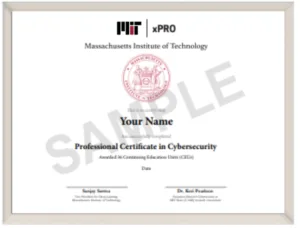Introduction
The MIT xPro Professional Certificate in Cybersecurity is one of MIT’s online certification programs to train professionals with in-demand industry skills. This blog post will review the cybersecurity certificate. It will highlight the key components of the certificate and ultimately if it is worth enrolling in.
Cybersecurity is one of the most in-demand skills in IT at the moment. According to Bloomberg, about 600,000 unfilled open cybersecurity jobs exist in the US alone. The International Information System Security Certification Consortium (ISC2) predicts that the Cybersecurity workforce will need to grow by 89 % to meet these demands.
What is the MIT xPRO Professional Certificate in Cybersecurity?
This is a professional certification that provides online training for a comprehensive introduction to cybersecurity from the broad aspects – the offensive and the defensive. It is taught and awarded by MIT faculty for professionals who want to venture into a career in Cybersecurity.

The program includes videos and courseware materials from MIT’s faculty tutor, personalized feedback from program leaders, insights from guest speakers, and career coaching opportunities. The schedule overall consists of :
- 1 live session Bi-weekly with program facilitators
- 15-20 hours a week.
- 24 weeks (1-week break after every 8 weeks)
- 3 weeks for Capstone projects.
The Certificate Curriculum
The curriculum of the MIT xPRO professional Certificate in Cybersecurity is divided into 3 sections. Each of these sections has 8 modules, making a total of 24 modules for the entire program.
Section 1: Introduction to Cybersecurity
You will learn the following in this section;
- Explore the basic concepts of computer security systems and their operations
- Explore the threat landscape and break down the types of threats and vulnerabilities
- Identify the key components and sequences of incident response frameworks
- Explore the fundamentals and strategies to protect systems
- Learn how to identify and test vulnerabilities
- Gain knowledge of privacy laws, regulatory agencies and resources, and the types of protection they provide
The Course modules for this section include;
- Module 1: Introduction to Cybersecurity and Risk Management
- Module 2: Cybersecurity Foundation Concepts
- Module 3: Federal Government Role: Law, Operations, and Standards
- Module 4: Threats and Vulnerabilities
- Module 5: Cybersecurity for Critical Urban Infrastructure
- Module 6: Identity and Access Management (IAM) Concepts
- Module 7: IAM Layers and Technology
- Module 8: Preparing for a Job in Cybersecurity Risk Management
Section 2: Defensive Cybersecurity
You will learn the following about Defensive Cybersecurity
- Explore the workings of secure communications between computer systems and organizations
- Learn how attacks are identified and how defensive cybersecurity responses are established
- Gain knowledge of the functions, strengths and weaknesses, and administration of Security Operations Center (SOC)
- Identify key components and sequences of incident response frameworks
- Learn how virtualization and the cloud are closely associated

The Course modules for this section include;
- Module 9: Introduction to Defensive Cybersecurity
- Module 10: Cryptography
- Module 11: Security Operations Center (SOC)
- Module 12: Incident Response (IR)
- Module 13: Secure Systems Administration
- Module 14: Secure Network Administration
- Module 15: Cloud Security
- Module 16: Preparing for a Job in Cybersecurity Operations
Section 3: Offensive Cybersecurity
You will learn the following about Offensive Cybersecurity in this section;
- Gain knowledge and understanding of how to identify and test vulnerabilities
- Observe simulated cyberattacks on web application security
- Learn to identify malicious activities cultivated by human actions
- Understand privacy policies and how they relate to data governance
- Learn to identify and mitigate risks associated with Operational Technology (OT) and Internet of Things (IoT) devices
- Explore artificial intelligence (AI) techniques and how they relate to the cyber environment
The Course modules for section 3 include;
- Module 17: Introduction to Offensive Cybersecurity
- Module 18: Penetration Testing Part 1
- Module 19: Penetration Testing Part 2
- Module 20: Social Engineering
- Module 21: Artificial Intelligence
- Module 22: Policy and Privacy, Regulation, and Data Governance
- Module 23: OT and IoT Risk
- Module 24: Preparing for a Job in Offensive Cybersecurity Operations
Who is the Program for?
The MIT Professional Certificate is for people who want to learn Cybersecurity skills and work as cybersecurity professionals. Either as
- A beginner with some IT background in Network engineers, Network administrators, IT Specialists, etc
- An IT Project manager, Engineer, or someone working in a security-related capacity and want to upgrade their skills and resume
- Someone who is at Mid- or later career professional in non-security roles and wants to transition into Cybersecurity
And anyone with a desire to learn Cybersecurity. Even people with non-technical backgrounds or who want to pursue the non-technical aspects of Cybersecurity.
What are the requirements for the MIT Professional Certificate in Cybersecurity?
There are no prerequisites for this program, no prior degree or experience is required. It is helpful, however, to have some technical basics in networking or IT in general.
How long does it take to Complete?
The MIT Professional Certificate in Cybersecurity lasts 24 weeks (6 months). You will need to devote about 15-20 hours a week to studies – course materials and videos, prerecorded MIT faculty videos, group discussions, self-studies, assignments, and projects.
It is also important to note that this program is self-paced. You can consume as many training materials as you want and appropriate to your level.
There are also live discussion sessions with program facilitators for mentorship and career support.
How Much Does the MIT Professional Certificate in Cybersecurity Cost?
The program costs US$7,650 which can be paid upfront in a single installment or in a series of 3 or even up to 6 installments. A breakdown of the payment schedule is as follows;
| Payment Type | Fees in USD |
| Upfront payment | US$7,650 |
| 3-Part Installments | US$2,961 + US$2,632 + US$2,631 |
| 6-Part Installments | US$1,760 + US$1,408 + US$1,408 + US$1,408 + US$1,408 + US$1,406 |
There are also discounts of up to 10 percent ($765) for every person you refer to the program. This can help you significantly to cut down on the cost.
What You Will Gain From the Program?
The certification program will teach you both the Offensive and Defensive aspects of Cybersecurity, how to use different frameworks, build Capstone Projects, and prepare you for a career in cybersecurity. You will learn;
- Apply cybersecurity concepts to real organizations and cyberattack scenarios
- Utilize the National Institute of Standards and Technology (NIST) model to understand and explain risk management
- Explore the landscape of various network threats and vulnerabilities and evaluate responses to each
- Create a digital journal of what you have learned along with a capstone presentation to share with potential employers
- Gain career insights from industry mentors and career coaches
Frameworks:
- NIST Framework
- CSA Cloud Controls Matrix framework, and
- MITRE ATT&CK.
Capstone Project and Portfolio:
- Build projects through hands-on learning
- Develop a Digital Journal to show employers why you’re right for the role
Career Guidance:
- Interview Preparation
- Best practices with networking & online presence (LinkedIn)
- Guidance from mentors and career coaches
Career Opportunities with the MIT xPRO Cybersecurity Certificate
The certification equips you to take on several entry-level roles in cybersecurity. You get foundational skills to advance careers as a;
- Cybersecurity Engineer
- Security Operations Center (SOC) Analyst
- Cybersecurity Analyst
- Cloud Security Engineer
- IT Security Specialist
- Cybersecurity consultant
- Incidence Manager
- Identity Access Manager
- Pentester
And several other security roles. The Salary range for a senior Cybersecurity Engineer in the US is $143K – $223K/year. (Glassdoor). Other similar Cybersecurity jobs are equally high-paying.
The Certificate you get

Upon completing the MITx Professional Certificate in Cybersecurity, you are awarded a credential (Certificate of Completion) from MIT that formalizes your training. The Certificate is only available in digital form and is sharable on Linkedin or on your resume. The MIT xPRO program is graded as a Pass or Fail, candidates must obtain a minimum of 75 percent to pass and obtain the certificate.
You also get 36 Continuing Education Units (CEUs) which you can use for further studies on the subject.
MIT xPRO certificates are recognized by many employers for employment roles.
Is MIT xPRO recognized?
Most employers do recognize the MIT xPRO certificate as valuable. Whether you land a job with it will depend on other factors such as how well you have developed your skills.
Within the MIT community, participants who complete an MIT xPRO professional certificate course or program are recognized as MIT xPRO Alumni. You join a community of accomplished professionals who have gained valuable knowledge and skills to excel at their jobs.
Is the MIT Cybersecurity Certificate worth it?
This is an excellent certificate for starting or advancing a career in Cybersecurity. It teaches you both the offensive and defensive aspects of Cybersecurity. You get to learn about various frameworks, build project portfolios, and prepare for a job role with the help of some industry experts.

Perhaps the most important pros of this certificate is that the awarding institution is MIT – one of the most prestigious institutions in the world. It scores high with most employers for job recruitment. What you pay for the MIT xPRO certificate is less than what you will pay per semester for any MIT degree program.
The downside is that the cost is expensive. Some full Master’s degrees do require that much and the certificate still does not accord you the privilege of being a full part of the MIT community and Alumni.
Overall, it is well worth every penny. The salaries of Cybersecurity professionals are among the highest in the industry.
You can see details of the certificate: https://executive-ed.xpro.mit.edu/professional-certificate-cybersecurity?
You may want to see: CYBERSECURITY OPERATIONS FUNDAMENTALS SPECIALIZATION REVIEW- WHAT YOU NEED TO KNOW




